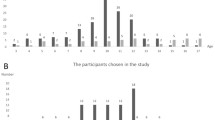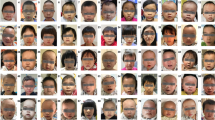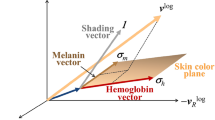Abstract
Turner syndrome adheres serious health-related complications with a tendency to affect various organs during different stages of life which includes hypertension, infertility, and retarded growth. The proper diagnosis of TS requires an expensive test named karyotype test which is not easily available in remote health care units in the countryside. Therefore, we proposed to use facial images to detect TS to pursue a higher accuracy of recognition. The proposed scheme achieved the accuracy of 91.3% with mixed feature extraction schemes using thirty principle components selected with criteria that retained 95% of the information from the turner dataset. Moreover, this research is the first that uses facial features to accurately diagnose TS patients and has the capability to help doctors to establish a cost-effective TS prognosis process in remote health care units that lack required health care facilities.
Access this chapter
Tax calculation will be finalised at checkout
Purchases are for personal use only
Similar content being viewed by others
References
Gravholt, C.H., Andersen, N.H., Conway, G.S., Dekkers, O.M., Geffner, M.E., Klein, K.O., Lin, A.E., Mauras, N., Quigley, C.A., Rubin, K.: Clinical practice guidelines for the care of girls and women with Turner syndrome: proceedings from the 2016 Cincinnati International Turner Syndrome Meeting. Eur. J. Endocrinol. 177(3), G1–G70 (2017)
Stochholm, K., Juul, S., Juel, K., Naeraa, R.W., Gravholt, C.H.: Prevalence, incidence, diagnostic delay, and mortality in turner syndrome. J. Clin. Endocrinol. Metab. 91(10), 3897–902 (2006)
Doi, K.: Computer-aided diagnosis in medical imaging: historical review, current status and future potential. Comput. Med. Imaging Graph. 31(4), 198–211 (2007)
Akhtar, F., Li, J., Azeem, M., Chen, S., Pan, H., Wang, Q., Yang, J.-J.: Effective large for gestational age prediction using machine learning techniques with monitoring biochemical indicators. J. Supercomput. (2019). https://doi.org/10.1007/s11227-018-02738-w
Akhtar, F., Li, J., Pei, Y., Azeem, M.: A semi-supervised technique for LGA prognosis. In: Proceedings of the International Workshop on Future Technology, FUTECH 2019, pp. 36–37 (2018)
Guo, L., Yang, J.-J., Peng, L., Li, J., Liang, Q.: A computer-aided healthcare system for cataract classification and grading based on fundus image analysis. Comput. Ind. 69, 72–80 (2015). Special Issue: Information Technologies for Enhanced Healthcare
Memon, S.A., Akthar, F., Mahmood, T., Azeem, M., Shaukat, Z.: 3D shape retrieval using bag of word approaches. In: 2nd International Conference on Computing, Mathematics and Engineering Technologies (iCoMET), pp. 1–7 (2019)
Li, J., Lu, L., Sun, J., Mo, H., Yang, J.J., Shi, C., Liu, H., Wang, Q., Hui, P.: Comparison of different machine learning approaches to predict small for gestational age infants. IEEE Trans. Big Data PP(99), 1–14 (2016)
Li, J., Liu, L., Zhou, M.C., Yang, J.J., Chen, S., Liu, H.T., Wang, Q., Pan, H., Sun, Z.H., Tan, F.: Feature selection and prediction of small-for-gestational-age infants. J. Ambient Intell. Hum. Comput. 1–15 (2018)
Zhang, K., Zhang, Z., Li, Z., Qiao, Y.: Joint face detection and alignment using multitask cascaded convolutional networks. IEEE Sig. Process. Lett. 23(10), 1499–1503 (2016)
Martin, G.J., Reisman, M.J., Noyes, A.P.: Digital processing of remotely sensed images. NASA SP-431. NASA Spec. Publ. 431(1), 107–112 (1980)
Gross, R., Brajovic, V.: An image preprocessing algorithm for illumination invariant face recognition. In: International Conference on Audio-and Video-Based Biometric Person Authentication, pp. 10–18. Springer, Heidelberg (2003)
Marĉelja, S.: Mathematical description of the responses of simple cortical cells. JOSA 70(11), 1297–1300 (1980)
Daugman, J.G.: Uncertainty relation for resolution in space, spatial frequency, and orientation optimized by two-dimensional visual cortical filters. JOSA A 2(7), 1160–1169 (1985)
Cortes, C., Vapnik, V.: Support-vector networks. Mach. Learn. 20(3), 273–297 (1995)
Hearst, M.A., Dumais, S.T., Osuna, E., Platt, J., Scholkopf, B.: Support vector machines. IEEE Intell. Syst. Appl. 13(4), 18–28 (1998)
Acknowledgement and Statement
This study is supported by the National Key R&D Program of China with project no. 2017YFB1400803. The authors declare that they have no conflicts of interest. All procedures performed in studies involving human participants were in accordance with the ethical standards of the institutional and/or national research committee and with the 1964 Helsinki Declaration and its later amendments or comparable ethical standards. Informed consent was obtained from all individual participants involved in the study. The study protocol and consent have been reviewed by the School of Software, Beijing University of Technology.
Author information
Authors and Affiliations
Corresponding author
Editor information
Editors and Affiliations
Rights and permissions
Copyright information
© 2020 Springer Nature Singapore Pte Ltd.
About this paper
Cite this paper
Gao, X. et al. (2020). Turner Syndrome Prognosis with Facial Features Extraction and Selection Schemes. In: Hung, J., Yen, N., Chang, JW. (eds) Frontier Computing. FC 2019. Lecture Notes in Electrical Engineering, vol 551. Springer, Singapore. https://doi.org/10.1007/978-981-15-3250-4_9
Download citation
DOI: https://doi.org/10.1007/978-981-15-3250-4_9
Published:
Publisher Name: Springer, Singapore
Print ISBN: 978-981-15-3249-8
Online ISBN: 978-981-15-3250-4
eBook Packages: Intelligent Technologies and RoboticsIntelligent Technologies and Robotics (R0)




